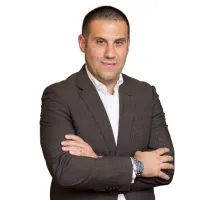

What Life-Changing Advice I Would Give My 21-Year-Old Self
21 is the age every one of us is just starting. We're full of ambitions and potential. We don't have many scars in our life that might hold us back. This is a very personal question. Everyone has different life experiences, backgrounds, shortcomings, and ambitions. My advice to myself probably will be a lot different than yours, but I'm sure it will trigger your thought process about what you'd tell yourself... what could you have done better or different?
At 21, I was doing my Master's Degree and at the same time working with night shift to be able to pay for my expensive tuition. I started doing the 9 to 5 grind before graduation and learned that a paycheck would never last till the end of the following month. I had no savings, but also I didn't have any debt. At that time, I did pretty well overall, but if I had a time machine, here is some advice for my younger self.

1. Networking
As a natural introvert, networking was one of my areas for self-improvement. It's not my comfort zone to build relationships with new people, but I naturally tend to form lasting friendships with the people I already know. I would tell my younger self to put more effort into networking, working within a team, and learning from more experienced older people (or mentors).
I was always much more comfortable talking to my peer group rather than those folks with much higher positions and work experience. I think having mentors and role models early in my career would have accelerated my career growth in the long run.
When I was in my mid 30's and learned the importance of networking, working with teams, and seeking the guidance of mentors and coaches, my life has transformed. I was able to leverage other peoples' experience, knowledge, time, and connections to 10X my results. Of course, each of the people whom I worked with also benefited from our business relationship. It was always a win-win arrangement.

2. Learn How to Delay Gratification
We all kind of follow a script that was handed over to us by our parents. We tend to value, first and foremost, a good job with a steady paycheck, good health, and retirement perks. When our income increases, we start seeking comfort and want things that give us instant gratification. Who doesn't like to wear designer brands, drive luxurious cars, live in a renowned neighborhood, travel on vacations, and enjoy their hobbies?
Many times, it's easy to give in to our desire for comfort. But if I can talk to my younger self, I would give myself the advice of sacrificing short-term gratification and prioritizing my goals. Most of us dream of having a great life and retiring wealthy, but we keep it as a dream or wish and never put it at the top of our goals. That's because we all find refuge in the easier objectives of security and comfort instead of bothering with the effort and education required to become successful.
Both security and comfort are short-term thinking of the poor and the middle class where a paycheck, health insurance, retirement plan, a house, a car, entertainment, and travel all offer the feeling of instant gratification. On the other hand, the wealthy have developed the discipline of sacrificing short-term indulgence and invested their time into their financial literacy. As a consequence, they enjoy much better and bigger things in the future. Their delayed gratification is way more rewarding.

3. Become Financially Literate
When I first joined the corporate world, it was challenging to work at night and study during the day, but at the same time a lot of fun. I was like a dry sponge, learning everything about running a business from the ground up. I met many interesting and really smart people... and each taught me something about business. Still, none was able to teach me something about personal finance, just because it appears that most people are not in control of their personal finances.
The income was nice, too, but I was never able to save and never knew where my income was being spent. I knew I was always waiting for the next paycheck to get out of financial stress, pay my bills, or make the minimum installment towards a loan or my credit card statement!
Earning good money before graduating was a nice start, but I think it was a mistake never to receive any financial education to control my cash flow. Now that I know more, I would tell my younger self to become financially literate before earning my first-ever paycheck to become a real pilot who's in control of his finances. We develop bad money habits from the point we start earning an income and never know how to invest it to build our net worth.

4. Self Discipline
Most of us become disciplined in what we do because someone else is watching us. We learn this at school, home, and even work. This is not self-discipline!
When you are self-disciplined, you do what you must, even if you've only made your promise to yourself. Consistency is harder when no one is clapping for you. You must clap for yourself during those times. Be your biggest fan!
I will advise my younger self to never wait to get in the mood to start working on a new project or task. Here's the truth: you are never going to be in the mood 100% unless you decide that you will do something. Act on what you need to do. Don't give yourself enough time to reason or talk yourself out of the things that you ought to do.
5. Create Baby Steps Routine Towards Your Long Term Goals
I don't know why, as young adults, we tend to think we can shoot for the moon, and even if we miss, we will reach the stars! With this thinking, we tend to set unachievable deadlines or goals, leading to failure. For some reason, we keep this mentality and repeat setting unrealistic goals until we fail too many times, and then we get demotivated and lose our confidence.
I will give my younger self life-transforming advice to think of his "Big Why"... this laser-focused strong thing that will make me move towards something I want in life. When this becomes clear, my younger self will realize that money is only an enabler to achieve greater things in life. What I learned is that my personal ambitions came first, before my financial ambitions. I discovered that my financial ambitions acted as enablers for me to achieve my personal ambitions.
Look ahead to around 3 to 5 years from now... even dare to envision yourself 10 years from now. Think about how your life will look like. Are your actions today directing you towards your "Big Why"?
I will advise my younger self to set realistic, challenging, long-term goals. I will whisper a secret to my younger self to break every task into baby steps, so I don't procrastinate. Consistent actions towards our goals will transform into a habit or a routine to plan our work and work our plan. It's much better to do one small step at a time than to try to do a lot and get stuck in the end.

6. Create Accountability
Be more accountable to your goals by letting other people know about them. Share your goals, ambitions, and even plans with someone you trust. This could be a colleague, friend, partner, mentor, or coach.
The simple act of sharing your goals and then trying to save face by simply making things happen - even if those actions appear overwhelming - will help you create self-accountability.
If this other mentor is more experienced, a mentor, or a coach who dares you do something beyond your comfort zone that will take you closer to your goals, you've got a healthy way of making things happen.
Imagine you could travel back in time and give your younger self some advice; what would it be?

Want to Talk to A Real Estate Coach
Let's set up a time to talk and discuss what your BEST PLAN would be to GET YOUR PERSONAL FINANCES IN ORDER and INVEST IN REAL ESTATE

